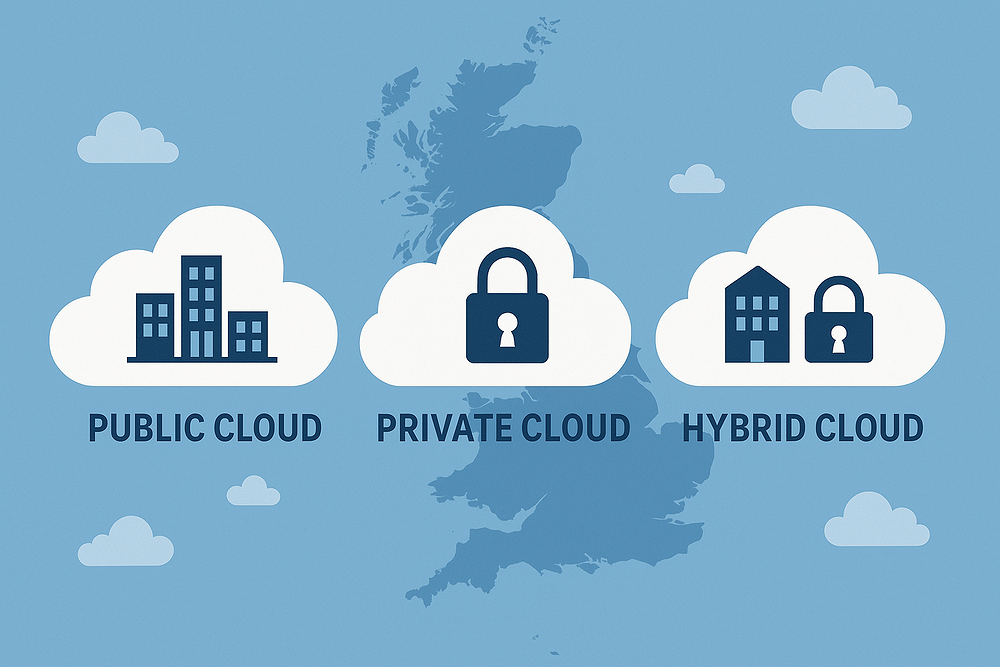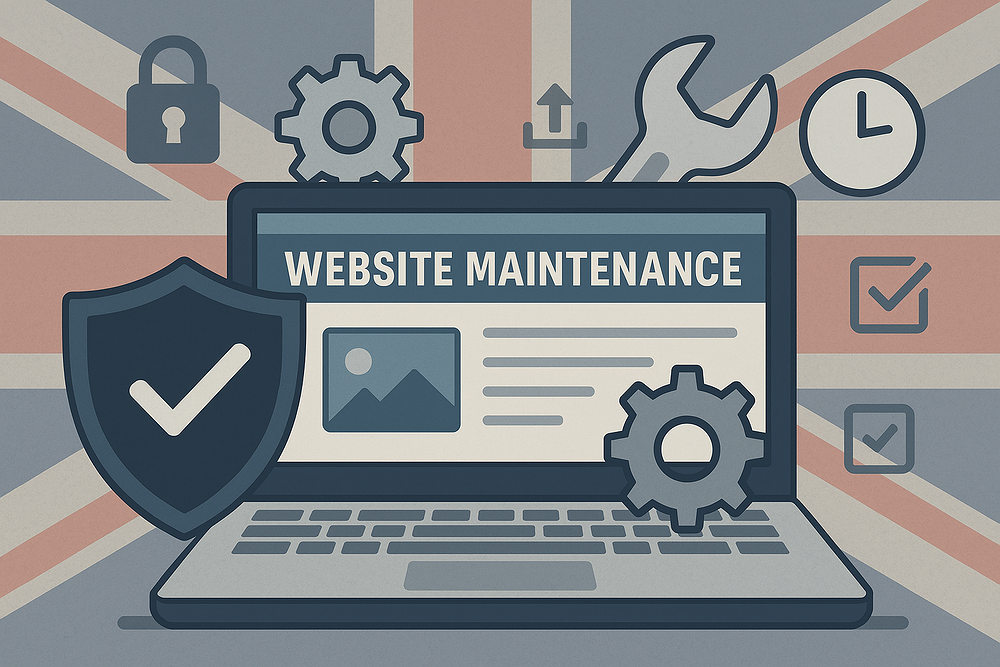Public vs. Private vs. Hybrid Cloud: Choosing the Right Solution for Your UK Business

In today's digital landscape, cloud computing has become essential for businesses of all sizes across the UK. Whether you're a startup in Manchester, an established enterprise in London, or a growing business in Edinburgh, understanding the different cloud models available is crucial for making informed technology decisions.
But with options ranging from public to private to hybrid cloud solutions, how do you determine which is right for your organisation? Let's demystify these choices and help you navigate the cloud computing landscape with confidence.
Understanding the Cloud Computing Spectrum
Before diving into comparisons, it's important to understand what each cloud model entails:
Public Cloud services are delivered via the internet by third-party providers who own and manage all hardware, software, and infrastructure. Examples include Microsoft Azure, Amazon Web Services (AWS), and Google Cloud Platform.
Private Cloud infrastructure is dedicated solely to your organisation, either hosted on-premises or by a third-party provider. You maintain complete control over the environment, which is protected behind your firewall.
Hybrid Cloud combines elements of both public and private clouds, allowing data and applications to be shared between them, offering greater flexibility and deployment options.
Public Cloud: Accessibility and Scalability
Advantages for UK Businesses
Cost-Effective Starting Point
For many UK SMEs, public cloud offers an attractive entry point with minimal upfront investment. You pay only for the resources you use, converting capital expenditure to operational expenditure—a significant advantage in today's economic climate.
Rapid Scalability
The ability to quickly scale resources up or down based on demand is particularly valuable for businesses with seasonal fluctuations or unpredictable growth patterns. This flexibility can be a game-changer for retail businesses during peak shopping periods like Christmas or Black Friday.
Reduced Maintenance Burden
With providers handling all maintenance, updates, and security patches, your IT team can focus on strategic initiatives rather than routine infrastructure management—a compelling proposition for organisations with limited technical resources.
Potential Drawbacks
Data Sovereignty Concerns
Post-Brexit, UK organisations must navigate both UK and EU data protection regulations. Public cloud solutions may store data in various global locations, potentially complicating compliance with the UK GDPR and Data Protection Act 2018.
Limited Customisation
Public cloud environments offer less customisation than private alternatives, which may constrain organisations with highly specialised requirements.
Shared Resources
Your applications run on shared infrastructure, which might impact performance during peak usage times, though most tier-one providers have largely mitigated this issue.
Private Cloud: Control and Compliance
Advantages for UK Businesses
Enhanced Security and Compliance
For sectors like finance, healthcare, and legal services, where data protection is paramount, private cloud offers superior control over security measures and data sovereignty. This can simplify compliance with industry-specific regulations such as FCA requirements or NHS Digital standards.
Customisable Environment
Private cloud allows complete customisation of your computing environment to meet specific operational requirements—ideal for businesses with unique or legacy applications.
Predictable Performance
With dedicated resources, you eliminate the "noisy neighbour" problem of shared infrastructure, ensuring consistent performance even during peak processing times.
Potential Drawbacks
Higher Initial Investment
Private cloud requires significant upfront expenditure on hardware, software, and expertise, making it less accessible for smaller businesses or those with limited capital.
Longer Implementation Timeline
Deploying a private cloud solution typically takes longer than signing up for public cloud services, potentially delaying your digital transformation initiatives.
Internal Responsibility for Maintenance
Your organisation bears the responsibility for maintenance, updates, and security—requiring dedicated IT resources and expertise.
Hybrid Cloud: The Best of Both Worlds?
Advantages for UK Businesses
Strategic Resource Allocation
Hybrid approaches allow you to keep sensitive applications and data in a private environment while leveraging public cloud for less critical workloads—an intelligent way to optimise your technology investment.
Business Continuity Benefits
With workloads distributed across multiple environments, hybrid cloud offers enhanced disaster recovery capabilities—crucial for maintaining operations in the face of disruption.
Incremental Cloud Adoption
For established UK businesses with significant on-premises infrastructure, hybrid cloud enables gradual migration to cloud services without wholesale replacement of existing investments.
Potential Drawbacks
Complexity of Management
Coordinating between different cloud environments adds complexity to your IT operations and may require specialised expertise or management tools.
Integration Challenges
Ensuring seamless operation between private and public components can present technical challenges, particularly for legacy systems.
Potential Cost Inefficiencies
Without careful planning, you might end up with cost inefficiencies from maintaining multiple environments.
Making the Right Choice for Your UK Business
When evaluating cloud options, consider these key factors:
1. Data Sensitivity and Regulatory Requirements
Assess the types of data your business handles and the regulatory framework you operate within. Financial institutions or healthcare providers managing sensitive personal data may require the enhanced security of private cloud for certain workloads.
2. Budget Constraints
Honestly evaluate your financial resources. If capital is limited, starting with public cloud services allows you to benefit from cloud computing without significant upfront investment.
3. Technical Expertise Available
Consider your in-house capabilities. Managing private cloud environments requires specialised skills that may necessitate hiring additional staff or extensive training.
4. Business Growth Projections
Factor in your anticipated growth. Rapidly expanding businesses might benefit from the scalability of public cloud, while more stable organisations could find private cloud more cost-effective long-term.
5. Application Requirements
Evaluate your application portfolio. Legacy applications with specific requirements might be better suited to private cloud, while modern, cloud-native applications can fully leverage public cloud advantages.
Real-World Applications in the UK Market
UK businesses across sectors are finding success with various cloud strategies:
- Financial services firms often adopt hybrid approaches, keeping sensitive customer data and transaction processing in private clouds while using public cloud for analytics and customer-facing applications.
- Retail businesses frequently leverage public cloud for e-commerce platforms that need to scale rapidly during peak periods, while maintaining certain business systems on private infrastructure.
- Manufacturing companies are increasingly using hybrid models that connect factory systems via private cloud while utilising public cloud for supply chain management and customer engagement.
Conclusion: There's No One-Size-Fits-All Solution
The optimal cloud strategy for your UK business isn't determined by following market trends, but by aligning technology choices with your specific business objectives, regulatory requirements, and operational needs.
Many organisations find that their needs evolve over time. You might start with public cloud services to minimise initial investment and gain cloud experience, then gradually incorporate private cloud elements as your requirements mature.
The most successful cloud implementations begin with thorough assessment and planning. By understanding your business drivers, technical requirements, and constraints, you can develop a cloud strategy that provides the right balance of cost-efficiency, security, performance, and flexibility.
Whether public, private, or hybrid, the right cloud solution will serve as a foundation for innovation and growth in an increasingly digital business landscape.
Need expert guidance on selecting and implementing the optimal cloud solution for your business? Our team of UK-based cloud specialists can provide personalised recommendations based on your specific requirements. Contact us today to start your cloud journey.
Talk to us about your next project
Our team of experts is ready to help bring your ideas to life with solutions tailored to your business.
Get in Touch

